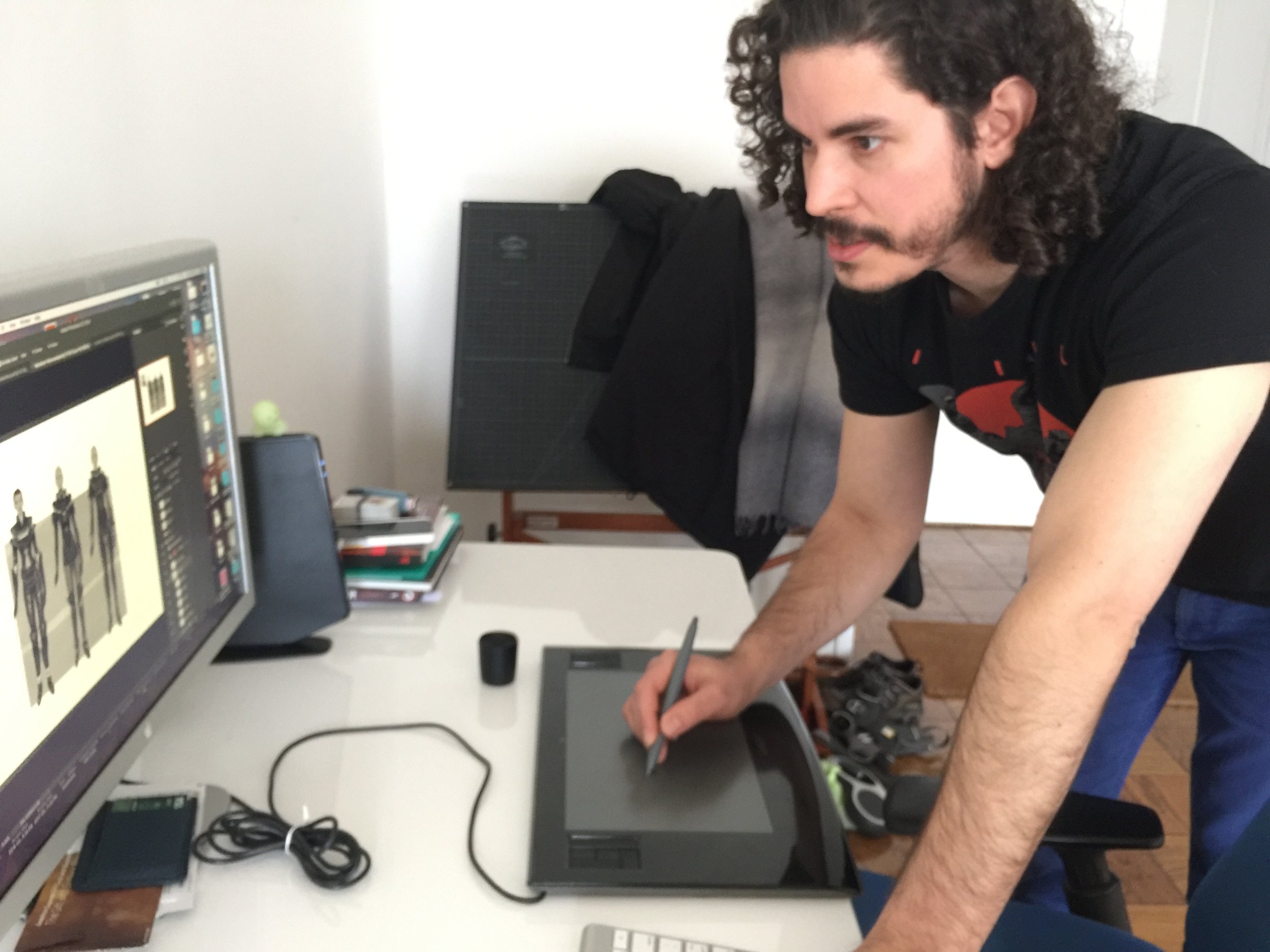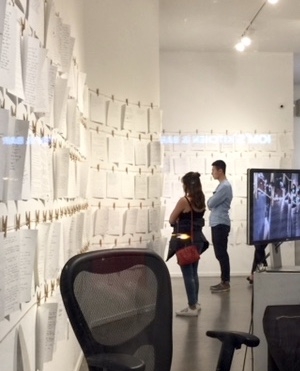Joceline O.--born in the United States to Peruvian parents--agreed to speak with me about living with difference. Some of her courses this final semester of college, Postwar American Fiction, Shakespeare--Tragedies and Romances, Nonfiction Creative Writing, and Chinese Civilization. Joceline describes herself as an American, Latinx, English major, only child, daughter of immigrants.
Who were you as a kid, Joceline? Do you have an early memory?
We used to live with my grandfather in Lima--on the second floor of his house. And my parents weren’t married actually. My grandfather thought it was important, because they were coming here to the US. If anything happens…
I remember the wedding, because I was five. It’s almost like a movie for me. We were in a room in the judge’s quarters. My mother was getting ready--it was a white dress, a little sexy actually with spaghetti straps. There was a veil--my mother had bangs--white pearls, and like a silver bracelet. Red lips. I was sitting on a fluffy chair or sofa, wearing a pretty dress too, so I felt special.
She was putting on lipstick at the mirror, and smiling, and my dad was laughing. Helping her with the veil. I remember standing on the side watching them. And then they kissed.
How did your parents get here? What was your life like growing up?
My parents met at the university in Peru in the 1980s. They came here in 1994. My mom was halfway pregnant, and I was born here. Then we left and retuned to the United States in 2000 when I was five.
We moved in with my uncle, my father’s older brother. He had a one-bedroom apartment in Queens. We lived in the living room. My tío was ambitious, wanted to be a doctor. He already had an American girlfriend. She was white and couldn’t speak Spanish. But my uncle had a beautiful accent in English. He never got to be a doctor and was bitter about that. I know he felt that we were holding him back. He didn’t invite us to come. We just crashed.
I remember a Chinese family in the neighborhood. It was funny because they didn’t speak Spanish, and we didn’t speak Chinese. One time they gave me a sandwich made out of rice. I ate it and didn’t like it, so I faked it and they gave me extra. But they lived better; there was light everywhere. The girl and I played, and I learned some words of Chinese. After that we moved to Washington Heights in the upper part of Manhattan.
My father worked in farms. He met in groups with other immigrants, and they would be picked up for work. He’d go to school and learn English at night, and my mom would take care of me. Eventually they switched, and mom went to school at night.
Actually, my middle name is Laurie. My dad gave me the name for his English teacher at the community college just before I was born.
My mom got a degree in business in Peru, but here it meant nothing. She was working in Grand Central Station at a cold cuts place. I would see her after school. I thought she worked in an amazing place, a palace. She was there because of me, and I loved food. I found out later that her boss was scamming her. The workers were her and an Asian immigrant. My mom wasn’t getting paid. She didn’t have the language, so couldn’t demand her pay. She lost about $300 dollars. It isn’t a lot, but it’s a lot. After that she started working at a medical office. Bills and coding. The doctor and his wife were Anglo-American. The patients and staff, Hispanic.
I’d done kindergarten in Peru, but I had to repeat kindergarten here. I went to PS 173. My teacher lived in my building too. She was Hispanic. After that it was all white. I was in ESL until my last year of elementary school. There were other children of immigrants. Most were Afro Latino.
Do you identify as “Latina”?
I think of myself as Latinx because it’s gender neutral. Some people say it’s not a real Spanish word. But--you know--language changes and evolves. I prefer Latinx and, if not, Hispanic. This helps me differentiate myself from Latinos from back home in South America and me and other Latinos who are from America.
Beyond these descriptors, how else do you see yourself?
I know people think I am very confident. Outspoken. My mother and father have abrasive personalities, so at home you have to make your point, stand up for yourself. I am not afraid of a fight--if it comes to talking. (Joceline's sense of self is compelling, also her compassion, and I wonder if these qualities aren't direct by-products of a close-knit immigrant family.)
Did you have any formal training in Spanish other than hearing it?
I came with kindergarten level Spanish. Ever since I got here my parents have been speaking to me in Spanish. They correct me. Say, I am mumbling something. “Habla castellano, que no te entiendo!” Speak clearly! I got it. I got it.
One of my best friends is ½ Mexican, ½ Chilean. We speak half sentences in each language.
Right now I finished up to level three in Spanish--native Spanish--here at Montclair. I am able to read and write a lot better than I used to. I took Spanish literature. I’ve studied Italian, too. When I write in Spanish, it feels like writing hurts my hand. (Joceline rubs her right hand.) In English it’s so easy for me…
It’s like breathing. You can’t hear the accent.
Is there someone who’s had a very big influence in your life?
My dad’s been the longest time with me. They were going to leave me with my grandmother in Peru, but he insisted on bringing me. He’s a drama king. A good man, influenced by Peru in good and bad ways. His work ethic is strong. I’ve inherited that too. He was in engineering when he left Peru. Laid off during Fujimori. Now he works in building maintenance for a real estate company. I’m very proud of him.
What do you see for yourself in twenty years?
I’m hoping to reach my peak at 50, not too fast. Hoping to work for the government--I like security, always. Hopefully I’ll have my law degree and my parents living next to me. Not in my house, but next to me. Maybe I’ll be married. Maybe I’ll have a daughter. In my career I’d like to be able to travel. Maybe romance. And helping the Hispanic community.
What do you think about the response by young people after the mass shootings in Parkland, Florida?
I am a little bit bitter. These are kids with a nice school. Police shootings are also involved and hurt Latinos and people of color. We should value the lives of kids in the schools and in the streets. They do have my support. There’s momentum now, and it may die down. When I’m in a position to help, I will help.
This country is my motherland. Peru is my grandma. I get mad with my motherland like I get mad with my mother. I get angry because I love this place. I like to visit my grandma.
I love the melting pot, honestly speaking. You can get out of your own bubble and be with others who are different. But I feel guilt too. The land belongs to Native Americans. The creation of the United States was based on injustice.
The love comes from my parents. When I complain, my parents will say, if you were graduating in Peru, you’d be in a small room. You wouldn’t have senators coming to speak to us. Be grateful for what you have here.
Joceline, what will you do after you graduate”
After graduation I’ll try to find a job in government. Keep going. I’ll be studying for my LSATS in November. I want to pay off my college debt.
Joceline accompanied me to the Au Bon Pain café on campus, where I ordered a cappucino before heading home. The rain had stopped, and the wind had died down.










